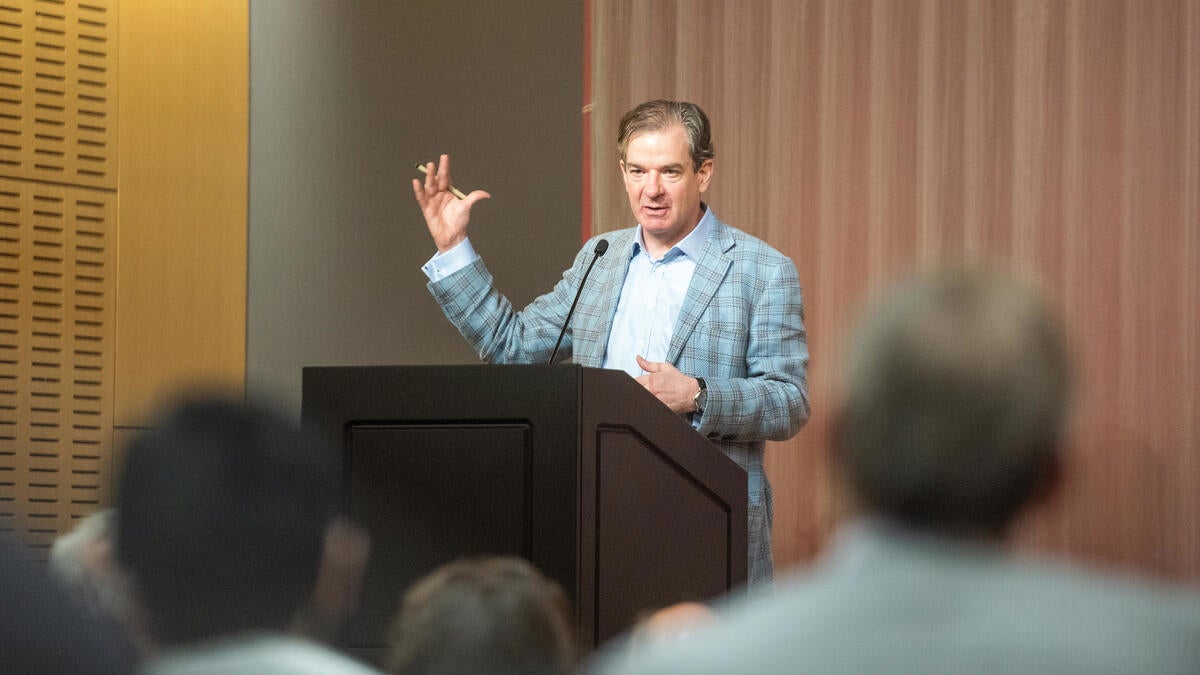President Donald Trump has three strikes against him when it comes to dealing with foreign and national security issues, according to one of America’s preeminent national security experts.
“He doesn’t do his homework. He doesn’t listen to his experts. He trusts his gut a lot,” said CNN senior national security analyst Peter Bergen, who is also a professor of practice in Arizona State University’s School of Politics and Global Studies and co-director of the Center on the Future of War. “And if you trust your gut, that works well in a market situation where you know all the players and you’re comfortable. That doesn’t work well when you’re in a really complicated situation where you’re eventually found out.”
Bergen presented a talk based on his new book, “Trump and His Generals: The Cost of Chaos,” on Thursday evening at the Memorial Union on ASU’s Tempe campus as part of the Center on the Future of War 2020 Spring Speaker Series.
“Peter Bergen is a vital voice regarding national security issues,” said Daniel Rothenberg, co-director of the Center on the Future of War. “... His new book, ‘Trump and His Generals: The Cost of Chaos,’ presents a unique perspective on how a group of military leaders navigated their relationships with President Trump and others in the White House, providing stories and previously untold details about many of the most important decisions of the last several years.”
In his book, Bergen examines the often complicated and strained relationships between President Trump and the national security establishment — the Central Intelligence Agency, the State Department and the Pentagon.
The book’s premise, based on more than 100 interviews, is that no president in American history brought less foreign policy experience into the White House than Trump. Bergen said Trump’s inclination is to use sheer might over nuance and diplomacy and that he is dangerously compulsive when it comes to potential conflict. Still, the book does not take an explicit stance for or against the Trump administration and has been praised by both former presidential adviser Steve Bannon and MSNBC host Rachel Maddow.
Bergen started the lecture by ticking through all of the military personnel Trump hired and then fired, or who wouldn’t take a position with him, rattling off the names of eight well-respected generals and foreign policy experts. Each one of them, Bergen said, had their disputes with Trump, challenging him on policy — mostly over military and foreign policy issues regarding the Islamic State group, the Taliban, Saudi Arabia, Iran, South Korea, Afghanistan, Pakistan, China and Russia. Regardless, each one was eventually shown the door or resigned.
“The first guard came in and were independent thinkers,” Bergen said. “Now we’re left with a group of people who are yes men. … Is it smart to have a team of acolytes and flunkies?”
He said Trump did get some things right: the fight against the Islamic State group, the Abu Bakr al-Baghdadi operation, and a willingness to address the security impact of Chinese policies, such as their theft of U.S. intellectual property.
However, Bergen said missteps like pulling out of the Iran nuclear deal, irritating NATO allies, coddling and misreading North Korea and, more recently, the assassination of Iranian military leader Qassem Soleimani have damaged our country’s foreign policy and significantly heightened tensions.
“Everybody seems to have calmed down from that (Soleimani’s killing), but that was sort of a manufactured crisis and didn’t need to happen,” Bergen said.
Bergen said military conflict and crisis usually defines a presidency, and until recently, Trump had been “pretty lucky.” However, he suggested that the novel coronavirus may well prove to be a defining moment for the administration. Bergen drew attention to questions about Trump’s approach, so far, to this growing crisis, such as telling the public a vaccine was a few months away when experts have stated it’s more likely 12 to 18 months.
“Is President Trump the right messenger to tell the truth?” Bergen said. “Sometimes the answer is no.”
He said that Trump tends to flip-flop, often taking credit for things that are positive and swiftly deflecting anything that is negative. Bergen added that Trump rarely takes responsibility for his actions when things go awry.
“He (Trump) tends to be a divider and not a uniter,” Bergen said. “It’s going to be hard for him to rise to the occasion.”
Top photo: Peter Bergen, CNN's national security analyst and ASU professor of practice, discusses his book, "Trump and his Generals" with audience members in the Memorial Union on Thursday. Photo by Meg Potter/ASU Now
More Law, journalism and politics

ASU experts share insights on gender equality across the globe
International Women’s Day has its roots in the American labor movement. In 1908, 15,000 women in New York City marched to protest against dangerous working conditions, better pay and the right to…

ASU Law to offer its JD part time and online, addressing critical legal shortages and public service
The Sandra Day O’Connor College of Law at Arizona State University, ranked 15th among the nation’s top public law schools, announced today a new part-time and fully online option for its juris doctor…

ASU launches nonpartisan Institute of Politics to inspire future public service leaders
Former Republican presidential nominee and Arizona native Barry Goldwater once wrote, "We have forgotten that a society progresses only to the extent that it produces leaders that are capable of…


